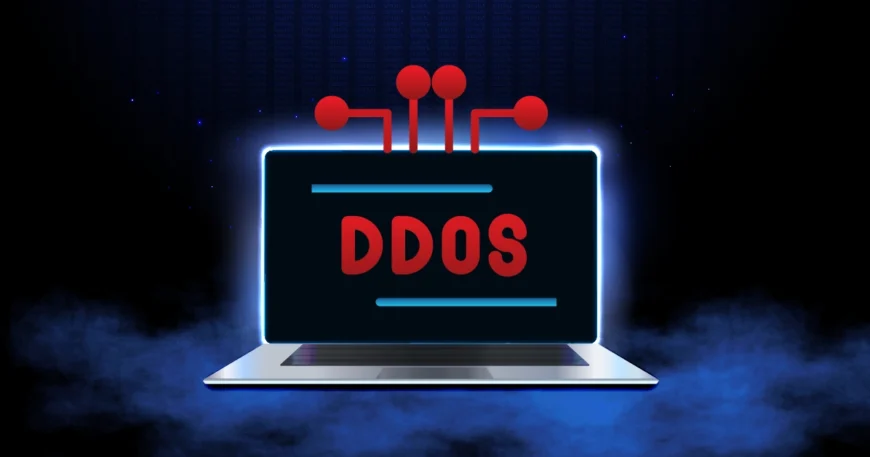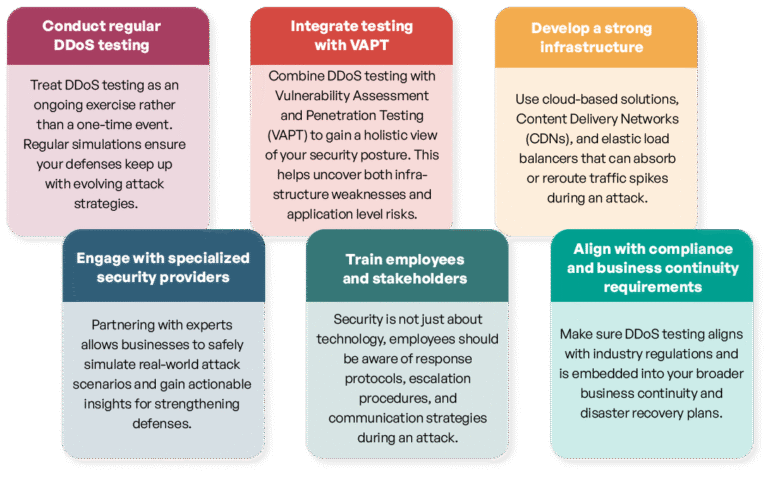


Imagine your online services grinding to a halt-not because of a technical glitch, but because your systems are overwhelmed by fake traffic. Customers can’t reach you, operations stop, and your reputation takes a hit. That’s the reality of a Distributed Denial-of-Service (DDoS) attack, one of the most disruptive threats businesses face today.
While many organizations invest in firewalls, antivirus, and intrusion detection, DDoS resilience often gets overlooked. That’s where DDoS testing comes in-helping businesses uncover weaknesses before attackers do.
When people hear about a Distributed Denial-of-Service (DDoS) attack, they often think of it as just a temporary website outage. In reality, the consequences go far deeper, impacting not just systems but the very foundation of a business.
→Financial losses: Every minute of downtime can cost businesses thousands in lost sales and disrupted services, especially in industries like e-commerce, banking, and SaaS.
→Customer trust erosion: Today’s users expect instant, uninterrupted access. If your website or application fails, customers may quickly move to competitors, and regaining their trust takes much longer than fixing your servers.
→Operational paralysis: A DDoS attack doesn’t only affect customer-facing services, it can disrupt internal systems, prevent employees from accessing critical applications, and stall productivity.
→Cover for larger attacks: Attackers sometimes use DDoS floods as a smokescreen to hide more dangerous intrusions, such as data theft or ransomware deployment.
→Reputation damage: News of prolonged outages can harm brand credibility, raising questions about your reliability and cybersecurity posture.
To defend effectively, businesses must understand how attackers operate. Some common DDoS attacks types include:
Attackers are getting smarter, often using botnets and IoT devices to launch large-scale assaults that bypass traditional defenses.

A DDoS attack is far more damaging than just slowing down a website. For businesses that rely heavily on online availability, such as e-commerce, banking, or SaaS providers, even a short disruption can lead to significant revenue losses. Every minute of downtime translates into missed transactions, interrupted services, and financial setbacks that can take weeks to recover from. Beyond financial losses, customer trust is often the biggest casualty. Today’s users expect seamless, always-on access, and when services become unavailable, frustration can quickly drive them toward competitors. Rebuilding that trust and restoring confidence in your brand is much harder than fixing the technical outage itself. The risks also extend to compliance and security. In regulated industries like finance or healthcare, prolonged downtime can trigger compliance violations and even legal penalties. Worse still, attackers often use DDoS assaults as a smokescreen to hide more dangerous exploits, such as data breaches or ransomware. This makes DDoS attacks not just a technical problem but a serious business risk that impacts revenue, reputation, and long-term resilience.
DDoS testing can be compared to a drill for your digital environment. Just as organizations conduct evacuation drills to prepare people for emergencies, DDoS testing prepares businesses to handle a sudden surge of malicious traffic. Instead of waiting for a real attacker to strike, companies can safely simulate different attack scenarios to observe how their system, networks, and teams respond. This proactive approach ensures that vulnerabilities are identified and addressed before they can be exploited.
DDoS testing has become critical due to evolving attack landscapes:

At StrongBox IT, we don’t just simulate attacks – we prepare your business for the real thing. Our approach to DDoS testing is designed to give organizations clarity, confidence, and resilience against evolving threats.
We safely replicate real-world DDoS scenarios, from volumetric floods to multi-vector assaults, to evaluate how your systems perform under actual attack conditions.
Every business has unique infrastructure and risk exposure. Our experts design customized testing plans that align with your industry, business model, and compliance needs.
We analyze the performance of your firewalls, Web Application Firewalls (WAFs), load balancers, and mitigation tools under stress, identifying gaps that attackers could exploit.
Beyond technology, we assess how effectively your teams respond during a simulated attack-measuring detection speed, communication, and recovery efficiency.
Our detailed reporting highlights vulnerabilities, suggests prioritized improvements, and strengthens both technical defenses and operational preparedness.
DDoS threats are evolving. We help organizations build an ongoing testing framework, ensuring defenses remain strong as technology and attacks change.
A DDoS attack doesn’t just stop your systems, it stops your business, your customer, and your reputation in its tracks. The truth is, you can’t always predict when attackers will strike, but you can prepare for it. That’s where DDoS testing makes all the difference.
At StrongBox IT, we don’t just run tests- we help you understand how you will hold up when it matters most. From uncovering hidden weaknesses to strengthening your response plans, our goal is simple: to give you the confidence that your business will stay online, no matter what.
Instead of waiting for an attack to reveal the cracks, let’s work together to build resilience today-so your customer never has to feel the impact tomorrow.
WhatsApp us

